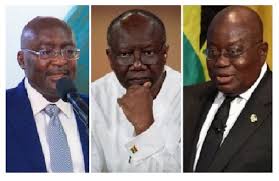
Don’t Rush Back to Eurobond Market, Fix the Economy First – World Bank Warns Ghana
Sep 27, 2025
by Ekow Benyah Sep 26, 2025

World Bank Rejects Akufo-Addo Gov’t’s Covid-19, Russia-Ukraine War Defence for 2022 Economic Crisis
September 25, 2025
The World Bank has dismissed the Akufo-Addo administration’s long-held defence that Ghana’s 2022 economic meltdown was primarily caused by external shocks such as the Covid-19 pandemic and Russia’s invasion of Ukraine.
In its 2025 Policy Notes on Ghana, the Bank said the crisis was largely self-inflicted, rooted in structural weaknesses and fiscal indiscipline.
“The deterioration of global conditions due to the COVID-19 pandemic and the Russian Federation’s invasion of Ukraine was not the cause of the 2022 macroeconomic crisis; rather, it merely exposed an economy already beset with deep structural vulnerabilities and precarious macroeconomic conditions,” the report stated.
For years, government officials defended the downturn—which saw record inflation, a collapsing cedi, and a sovereign debt default—by pointing to global disruptions. But the World Bank’s analysis puts the blame squarely on domestic mismanagement.
The report cited weak governance, political short-termism, and failure to implement reforms. It noted that easy access to international capital markets and expectations of resource windfalls encouraged fiscal excesses and undermined accountability.
The Bank also highlighted a long-running pattern of overspending followed by harsh corrections, a cycle that has driven Ghana into 17 separate IMF programs since independence.
The economic collapse and its aftermath pushed an estimated 800,000 Ghanaians into poverty, according to the report. With incomes stagnant around US$2,200 per capita for over a decade, poverty now affects more than a quarter of the population.
Concerns were also raised over renewed fiscal excesses in the 2024 election year, when unbudgeted commitments of about US$4.8 billion—equivalent to 5.7% of GDP—were made outside official financial systems.
“Spending indiscipline poses a critical challenge to Ghana’s macro-fiscal stability,” the Bank warned, cautioning that unchecked borrowing and budget overruns threaten long-term sustainability.
The report flagged persistent inefficiencies in key sectors. The energy sector continues to drain about 2% of GDP annually through arrears, while COCOBOD’s debt had ballooned to US$1.8 billion by 2024, with interventions distorting farmer incentives and weakening industry competitiveness.
The World Bank stressed that Ghana is at a crossroads and must “signal a clear break from the past” to regain citizens’ trust. Its recommendations include:
Restoring fiscal discipline
Expanding the tax base
Reforming state-owned enterprises
Strengthening governance
Without decisive action, the Bank cautioned, Ghana risks remaining stuck in the cycle of crisis and bailout that has defined much of its post-independence economic history.

Sep 27, 2025

Sep 26, 2025

Oct 22, 2025

Feb 15, 2025

Sep 13, 2025

Apr 25, 2025

Jan 26, 2026

Sep 15, 2025